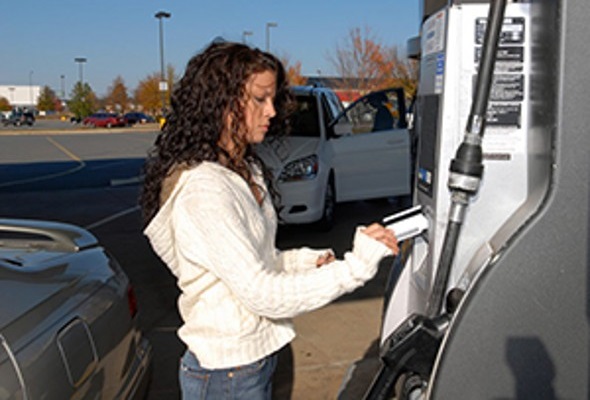We’ve all seen the news stories lately about virtual identity thieves hacking unsuspecting customers’ credit card accounts but there’s another growing scam you may not be aware of. Skimming is becoming an increasingly popular way for crooks to access your credit and debit card information which can then be used to pilfer your accounts.
5 Things You Need to Do When Your Identity’s Been Stolen
How Skimming Works
Skimming is attaching a third-party card-reading device to a card-swiping terminal, like the kind found at gas stations. When you swipe your card, the device records the data stored on the magnetic strip. This information can then be used to complete fraudulent purchases or make counterfeit cards. Before you know it, your weekly fill-up has turned into a financial nightmare.
While the technology involved is complex, the way these scams are carried out is deceptively simple. Skimming is often successful simply because people aren’t paying attention. If you’re worried about the safety of your credit and debit card information, there are some things you can do to protect yourself.
1. Give Card Readers a Closer Look
Before you swipe your card at the gas station or feed it to the ATM, take a minute to check for signs that the terminal has been tampered with. If you notice any damage, such as scratches or fittings that appear to be loose, it could be a sign that thieves have had their hands on the machine.
Even if things look okay on the surface, check the card reader itself for potential red flags. If the reader is sitting in an unusual position or just looks off in any way, you may be better off keeping your card in your wallet. Check the keypad for unusual signs of wear or buttons that don’t seem to fit. Finally, take a look around for a hidden camera that thieves can use to record you entering your information.
2. Protect Your PIN
Without your PIN number, there’s only so much damage an identity thief can do so it’s important to keep this information close when you’re out in public. Covering the keypad with your hand is an easy way to shield your PIN from would-be criminals. Choose a PIN that’s something only you would be able to remember and don’t write it down or share it with others unless absolutely necessary. Changing your PIN every few months also cuts down on the odds of successful skimming.
3. Stick to Familiar ATMs
Virtually everywhere you go, you’re sure to find an ATM but you should be careful about where you use your card. Free-standing ATMs such as the kind that are found in shopping malls and convenience stores are a prime target for skimmers. Even if it means having to travel a few extra miles out of your way, you’re better off sticking to an ATM at a bank since these tend to be more closely monitored.
4. Pay With Credit When Possible
While using a credit card instead of debit won’t prevent skimmers from stealing your information, it does offer you certain benefits that you wouldn’t have otherwise. Credit card companies give you broader protection when it comes to liability for fraudulent charges. If your debit card is stolen, you’re subject to tighter restrictions that could leave you on the hook for fraudulent activity.
Top 5 Frequent Credit Card Mistakes
Read over your credit card agreement carefully so you know exactly what your rights are. If you only use a debit card, look for places where you can process your transaction as credit. You’ll still be governed by the bank’s rules but you won’t have to enter your PIN.
5. Keep an Eye on Your Accounts
Often what happens with skimming victims is that they don’t realize they’ve been targeted until weeks or even months later. By this time, the damage has already been done. Checking your bank and credit card statements regularly can help you spot any potentially suspicious activity and stop skimming in its tracks.
It’s also a good idea to monitor your credit report to make sure no new accounts have been opened in your name. You can also see how many inquiries have been made into your credit history. If you see an inquiry for a creditor you don’t recognize, it could mean your information has been compromised.
The more you know about credit and debit card scams, the better especially as criminals look for new ways to get their hands on your information. While there’s no way to insulate yourself completely, increasing your awareness can go a long way towards keeping your financial details safe.
Photo Credit: UniBulMS
